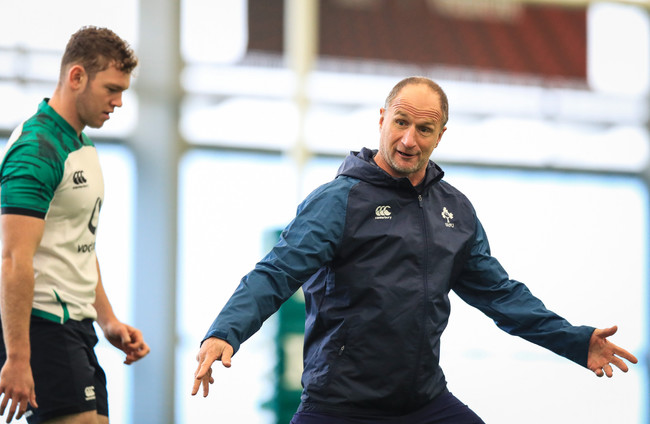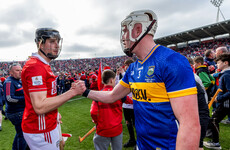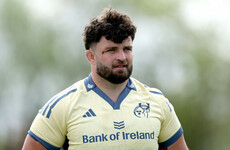EVERYWHERE YOU GO in rugby these days, someone is studying the Ireland attack.
As Andy Farrell’s side have won a Triple Crown and beaten the All Blacks in their series over in New Zealand this year, they have continued to play a highly-attractive, highly-effective brand of rugby.
Operating with a 1-3-2-2 framework, Ireland have encouraged huge amounts of interplay between their forwards and backs, with big men like Tadhg Furlong bringing passing skill to the party on top of the usual physical effort expected up front.
So it’s no real surprise that the Irish attack is now studied as best practice around the world. Even in last Friday’s win for Emerging Ireland against the Griquas in South Africa, we saw a team of young Irish players that had only come together a week before operating with hints of the same fluidity as Farrell’s senior side.
“It’s just the way we do things, I suppose,” is how Ireland attack coach Mike Catt puts it.
Catt is leading the attack on this Emerging trip and the tourists have implemented exactly the same systems, shapes, and plays as the senior Test side. He hopes to see more success in today’s clash with the Pumas in Bloemfontein [KO 4pm Irish time, SuperSport livestream].
“We believe it’s the way the game goes at the moment,” he continues. “It might change a year down the line or whatever. What we’ve been able to do is get the players… you’ve got to remember that it’s been 18, 19 months, nearly two years now that we’ve been in this process.
“I’ve always said that rugby is about decision-making. That’s all we’ve got the players to do. The players are now making good decisions and that’s manipulating a defence. So whichever shape or whatever we put up there, the players have still got the same process to go and make the right decisions at the right time. Ultimately that’s our goal.”
Skillful forwards are key to the Irish approach and it’s exciting that the Emerging Ireland squad is packed with youngsters in that mould. As we have seen for years now with the Ireland U20s, young Irish forwards can play.
“We’re not asking them to do something they can’t do,” says Catt. “We’re asking them to stay square and pass the ball three metres. It’s pretty simple and everybody looks at it as if it’s pulling rabbits out of the hat.
“It’s a very simple way that we coach and want the players to do. As long as they understand what they have to do and why we do it, the players then just have to make the right decision on the back of it.”
Catt says it does help that the four Irish provinces now operate with a similar-ish ethos, even if there are clear differences. With Munster moving in a new direction under their new coaching staff, they have joined Leinster, Ulster, and Connacht in asking all of their players to be decision-makers.
“We had Pete Wilkins [the Connacht head coach] on the New Zealand tour with us and he has taken a few things back there,” says Catt.
“What it does is just give a player a little bit of a stepping stone so that when he comes into an Ireland environment, they understand what we’re trying to achieve, how to do it. They’re not trying to catch up from too far away, so they can adapt quicker.
“Yes, it helps us massively but it helps the player to be selected into the Ireland side as well, that’s crucial and that’s going to bring a lot of competition to the squad. Ultimately, that’s what we want – to select the best of the best.”
Emerging Ireland:
- 15. Chay Mullins
- 14. Ethan McIlroy
- 13. Antoine Frisch
- 12. Cathal Forde
- 11. Andrew Smith
- 10. Jake Flannery
- 9. Michael McDonald
- 1. Callum Reid
- 2. Diarmuid Barron
- 3. Roman Salonoa
- 4. Cormac Izuchukwu
- 5. Brian Deeny
- 6. Cian Prendergast (captain)
- 7. John Hodnett
- 8. James Culhane
Replacements:
- 16. Dylan Tierney-Martin
- 17. Josh Wycherley
- 18. Sam Illo
- 19. Tom Ahern
- 20. David McCann
- 21. Ben Murphy
- 22. Jack Crowley
- 23. Shane Daly
Pumas:
- 15. Devon Williams
- 14. Jade Stiglingh
- 13. Sebastiaan de Klerk
- 12. Wiaan van Niekerk
- 11. Etienne Taljaard
- 10. Tinus de Beer (captain)
- 9. Chriswill September
- 1. Corné Fourie
- 2. Eduan Swart
- 3. Ig Prinsloo
- 4. Malembe Mpofu
- 5. Shane Kirkwood
- 6. Jaco Labuschagne
- 7. Kwanda Dimaza
- 8. André Fouché.
Replacements:
- 16. Llewellyn Classen
- 17. Etienne Janeke
- 18. Simon Raw
- 19. PJ Jacobs
- 20. Anele Lungisa
- 21. Khwezi Mafu
- 22. Franna Kleinhans
- 23. Givan Snyman
- 24. Lucky Dlepu
- 25. Gene Willemse
- 26. Ali Mgijima
- 27. Diego Apollis
- 28. Lundi Msenge
Get instant updates on your province on The42 app. With Laya Healthcare, official health and wellbeing partner to Leinster, Munster and Connacht Rugby.














Methinks, not treated the best by Potter.
From an Irish perspective first team football is crucial for Duffy. With Ben White being kept at Brighton, seen as they has turned down a 30 million bid you’d think he’ll be above Duffy in the pecking order.
I think the best move for Duffy now to get regular games might be a loan move to Celtic. I wouldnt like to see him in the Scottish league for more than one season though which is why i think a loan move is best.
Next summer then there might be better options for a permanent move.
@Gareth Ward: He’s too good to be playing in the Scottish league in my opinion. Definitely good enough to be playing for some premier league side
@Miguel Sanchez: Agreed but there doesn’t seem to be many decent interested teams in the premier league though
@Gareth Ward: doesn’t have to be a top prem team, even playing every week for one of the new boys would be better prep for Ireland games than playing for Celtic (particularly now they won’t be in champions league).
I’d say/hope he is holding out for an approach from prem knowing Celtic will snap the hand off him if he does go back to them.
(Not trying to have a pop at Celtic here, looking purely at what’s best for Ireland)
@Gareth Ward: West brom would suit
@Gareth Ward: either West Brom or an improving West Ham team would be a good move for him. I agree with the previous poster and he is far too good to play for Celtic. Personally I think he is a better defender than either Dunk or Webster and offers a threat from set pieces. He’s just coming into his prime now. He should definitely be able to stay in the premiership
@Ger: West ham look fairly solid at center back with ogbonna and diop. So its hard to see him breaking in there
@Ger: Well does Graham what ever his name is value your opinion?
Obviously not as he wants to off load Shane Duffy.
So realistically a loan season with Celtic could be good for all parties.
Duffy is a Celtic supporter and reports suggest he wants this loan move.
Shore up a porous Celtic defence by doing the business and who knows like Virgil Van Dijk before him becomes more than a sought after defender again
Meanwhile Brighton will be happy to sell if they get relegated – which is a distinct possibility.
QED.
I hope he join Celtic on loan so that he has a chance to win silverware especially aiming for the 10 in a row SPL titles!
@Mícheál Moran: Would the equivalent of a League One title satisfy a man with almost 100 premier league appearances? He has to be looking at staying in the top league or at the very least a decent championship team. He may as well move back to the Brandywell as traipse up to Glasgow.
@M:
Ah I know but if a Premiership club don’t snap him soon before the transfer window close then he should go to the SPL.
Crystal Palace should snap him up, mad he can’t get a game
Sometimes in football, you’re face does not fit with the manager, then it’s time to go. Duffy is too good not to be playing regularly
He’s a premier league centre half, to good for the championship ,one of the best in the air in the league , only 28 ,good age for a CB very surprised a top 6 club have not came in
Celtic really do need a few signings